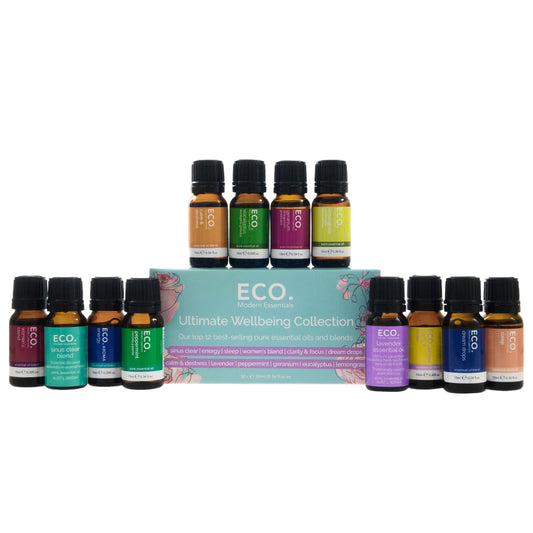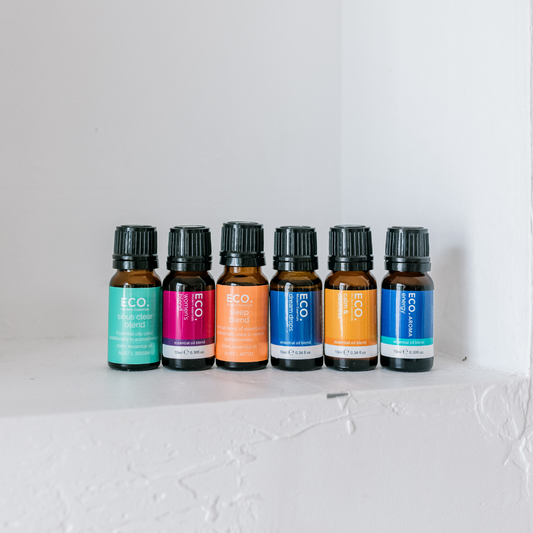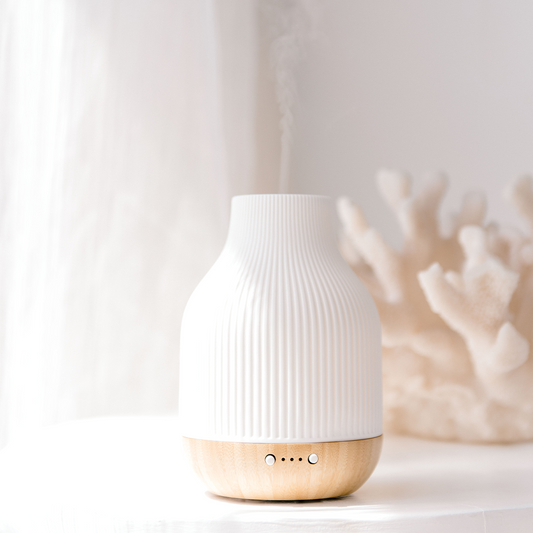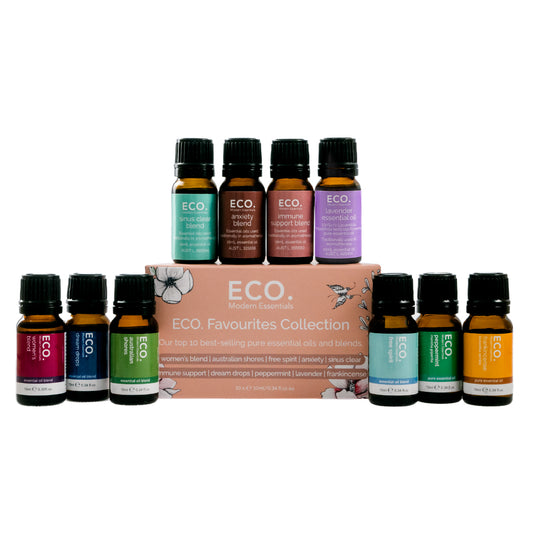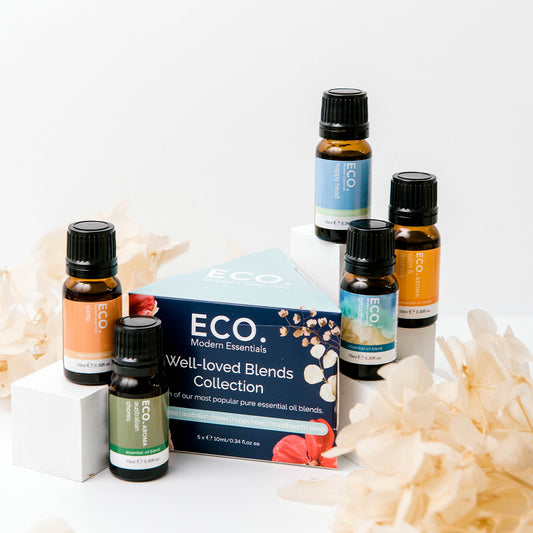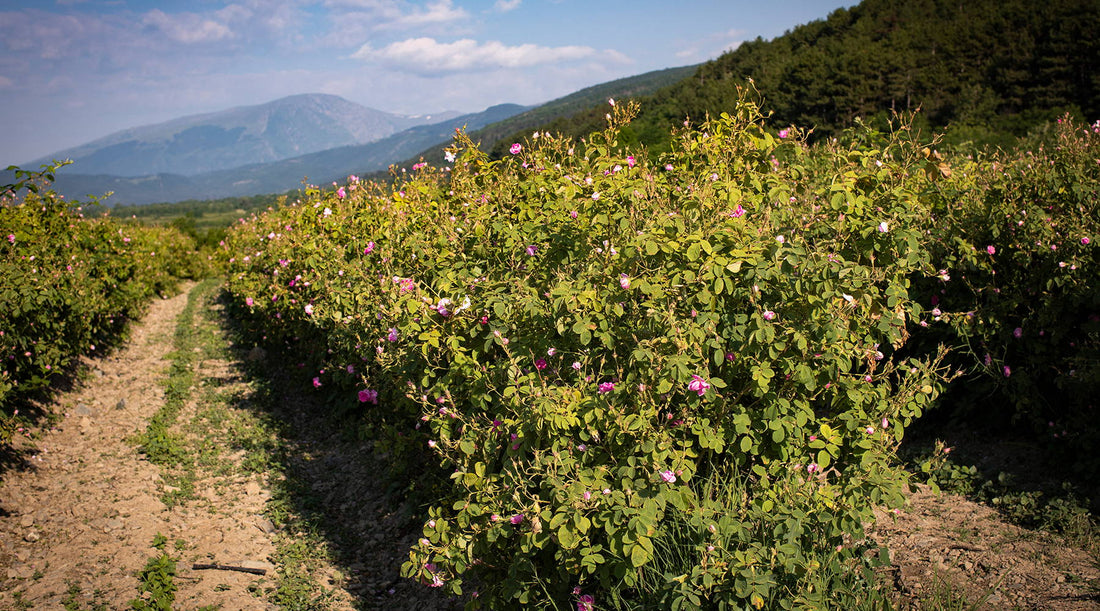
Benefits & Uses of Rose Essential Oil
Helpful during times of sorrow, grief and heartache, the scent of Rose will gently soothe the heart and uphold the spirit. With antidepressant and sedative properties, Rose can help ease our way through mood changes around cycles as well as maintain a regular menstrual cycle and help relieve cramping.
Where is Rose essential oil from?
Somewhere between the Balkans and the Sredna Gora mountain ranges in Central Bulgaria lies what is known as the Valley of Roses. The picturesque valley is surrounded by a number of old-fashioned towns where people have been planting, picking and processing roses for over 300 years. There is something about the climate of the area that creates the optimal conditions for what is considered to be some of the best rose essential oil in the world. Every year between May and June, the skilled harvesters wake up at dawn to carefully pick the roses while the petals are still covered in the morning dew. Each rose has 30 petals, and it takes 4000kg of rose petals to produce 1kg of 100% pure distilled rose essential oil.
How is Rose essential oil made?
Harvest occurs only one month per year, between May and June. Bulgaria is blessed with steady rainfall in Spring, ensuring roses receive continuous sustenance until harvest. New rose fields are planted by hand every year in November, and require 2 to 3 years of growth before the flowers are considered mature enough for distillation. Each bush will produce around 40 flowers and each bloom has 30 petals. The harvest is a labour of delicacy and efficiency. The rose blossoms are picked by hand with the first light of dawn before the day becomes too hot and the oil contained within the petals starts to evaporate. The rose is suitable for distillation as long as its centre is bright yellow. Once it has turned brown, the quality of the petals has been lost. Because the life of a rose petal is so short, they are transported to the distillery for extraction as soon as they are picked. On average, a picker can harvest between 30-40 kg of rose flowers per day.
Bulgaria traditionally produces between 2 and 2.5 tons of rose essential oil each year. Often referred to as ‘liquid gold’, it takes around 4 tons of rose petals to produce 1 kg of pure rose essential oil. The freshness of the flowers, the quality of the water used and the distillation process itself determine the final quality of the rose essential oil produced. Our distilleries use their own pure water source, and stainless steel stills in their distillation facilities.
The rose essential oil industry in Bulgaria is nearing what we can call a closed-loop system. From the picking to the distillation and exportation, the environmental and community impacts are taken into consideration. Most distilleries use natural gas, which is both cost efficient and least impactful on air pollution. The standard rose petals to water ratio is usually 1:4, however some distillers use 1:1. As a general rule, all that is left after the distillation process is mushy rose petals. Instead of being thrown away, they are repurposed into organic fertiliser. Some distillers have their own irrigation system, and engage in periodical replanting and rejuvenation. The University of Bulgaria is also currently experimenting using rose petals in food products such as biscuits and cakes.
What does Rose look like?
Rosa x Damascena, more commonly known as the Damask Rose is a deciduous shrub growing up to 2.2m with stems covered in crubed prickles. It's colour is light to moderate pink. Each bloom has around 30 petals.
What does Rose essential oil smell like?
Rose has a very rich and deep floral scent with hints of spice and sweetness, resembling honey.
History of Rose essential oil
It is believed that the first rose was taken from the Middle East to Bulgaria in the 16th century. Rosa Damascena is considered to produce the highest quality rose essential oil. The majority of local pickers have been part of the rose harvesting industry for generations, inheriting the skills of family members over the years. The locals of the area have been involved in the harvesting and distillation of rose essential oil for over 300 years. Originally, wood fired heated copper stills named ‘Kazans’ were used to produce the oil. Nowadays, most distillers use stainless steel stills and automatic control systems, ensuring efficiency in process and improved quality control.
The rose industry is mostly generational, and is crucial to the local economy. The majority of pickers live locally and in gypsy communities. Several rose growers and distillers are known as fair employers and offer employees a range of benefits including help with health insurance,housing and community support. This is crucial in preserving the rose industry and ensuring highly skilled pickers every season. As with any weather dependent industry, rose picking is subject to climate change and unforeseen environmental events.
What are the benefits of Rose essential oil?
1. Headaches: Although Lavender or Peppermint essential oils are commonly used to relieve headaches, sometimes their aroma is too powerful during a headache. Rose essential oil is an excellent alternative with its light fragrance. The cooling and calming nature of Rose can help soothe tension headaches with a cold Rose oil compress applied to the forehead.
2. Heart: Rose essential oil has long been considered a tonic for the emotional and physical heart. Some studies show that Rose helps to steady the heart beat in the case of arrythmia and may slightly lower blood pressure. Rose has been prized as a general tonic for heart health.
3. Reproductive Health: Rose essential oil may be useful in the management of excessive menstrual bleeding and reduce pain associated with uterine cramping. A gentle and safe essential oil suitable for use during pregnancy and with young children.
4. Skin Care: Rose can be added to serums and moisturisers and is beneficial for all skin types. Rose essential oil has hydrating and anti-inflammatory properties that nourish dry or sensitive skin. The cooling nature of Rose may relieve allergies, eczema and broken capillaries.
5. Love: Roses are a symbol of love across many cultures. Rose essential oil has an affinity with the emotional aspects of the heart. Rose can encourage and restore a sense of self love after a set back or disappointment. Rose may also promote feelings of universal love for others and a desire to create harmony amongst all life on Earth.
How do you use Rose essential oil?
Contraindications of Rose essential oil
We do not recommend using Rose in the early stages of pregnancy. However, safe to use in the last few weeks of pregnancy and during labour if desired.





